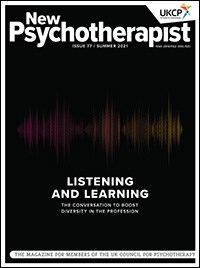
Provision of psychotherapy for South Asian communities
 The summer issue of the New Psychotherapist looks at diversity and how a more diverse profession will help to increase access to psychotherapy for minority communities. We received a tremendous response to our call for members to give a snapshot of their practice and discuss what inclusion means to them and not all could be included in the magazine.
The summer issue of the New Psychotherapist looks at diversity and how a more diverse profession will help to increase access to psychotherapy for minority communities. We received a tremendous response to our call for members to give a snapshot of their practice and discuss what inclusion means to them and not all could be included in the magazine.
Here, psychosynthesis psychotherapist Nila Yasmin discusses the challenges faced by ethnic minority groups in accessing psychotherapy and mental health services.
At the deepest level – the level of the soul – the same threads are woven through the issues that all my clients bring, whether they are from a minority or not. These are the human questions that face all of us. Who am I? What does my life mean? Where do I belong? Why am I suffering? The lived experience of these questions is complex and unique to each individual but there are particular issues that affect everyone who is from a minority background.
Living in a society where what you are and the colour of your skin is different from the dominant culture has a profound impact on my clients’ sense of who they are and who they can be. They are denied access to the advantages that are unquestioned by those who have white privilege. Many of my clients have grown up with experiencing racism in its various guises and often, so too have their parents. It's very hard to trust when racism is always a possibility.
For many of my minority ethnic clients, it has been very important for them to work with someone who is familiar with their cultural heritage and they have actively sought out a brown-skinned therapist. They are juggling two cultures and want someone who understands that.
I worked for five years on an adult mental health information service where part of my role was to signpost people to relevant services. There was never enough ‘supply’ for the demand, but in my five years in that post I saw both statutory and voluntary sector services being depleted and disappearing.
People from ethnic minority groups are more likely to be socioeconomically disadvantaged, to have language barriers and be experiencing multiple disadvantages and types of discrimination, so it's hardly surprising that there are massive inequalities in accessing psychotherapy and mental health services.
There are also issues that come from within. For example, within the South Asian communities, elders in the family are the place to go to get advice and support and seeking it elsewhere is often unsupported or discouraged. My clients who are from ethnic minority groups are often young adults and I wonder if that indicates that culturally, something is shifting in younger British South Asians. I do notice though, that most of them don't share with their families that they are having psychotherapy.
I would love to see more provision for those who are economically disadvantaged to be able to receive the services that they need and to benefit from the profound change and healing that depth work can bring. Beyond that, I wonder what would be possible if white privilege was fully recognised by individuals and society as a whole.
Share
Like most websites, we use cookies. If this is okay with you, please close this message or read more about your options.


